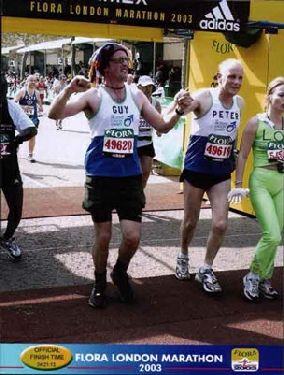
Home TPSA Story Trustees & Helpers Helplines Contact Us Forthcoming Events Disclaimer
Newsletters Become a Member Become a Volunteer Make a Donation
Symptoms Diagnostic Test Compare Treatments Self Help Options TPSA Buddies Patients Experiences Internet Resources

About

Info

News

Donate

Meetings


TPSA
Torbay Prostate
Support Association
Copyright © TPSA 2015 Registered Charity Number -




Serving men of all ages, and their partners, through a program of support before, during and after diagnosis.


Peter Loader's Marathon Fight
The Nineties were ten years of blissful ignorance for me. I thought the hesitation before passing water, the stop and start and the weak flow were just that I was getting older, even though I was only in my late forties.
We all know an 8 year old boy can pee a considerable distance and a 90 year old often gets his shoes wet! I was somewhere in between, but much nearer the 90 year old than I cared to admit. And that back ache was surely just the result of heavy lifting and handling cattle for all those years.
On June 27th 2000, I had a x-
Well, that was over 3 years ago and to celebrate passing the average prognosis, my
son and I ran The London Marathon in 4hrs 20 mins (raising £4,400 for The Prostate
Cancer Charity) and I recently completed the 84 mile Hadrian's Wall path -
So what have I done in the last three years. In some respects I was 'lucky'. The
cancer had spread so I didn't have to make the mind-
I became 'sort of' computer literate so I now read thousands of emails of diagnosed men talking to each other and discussing every aspect of the disease.
I sometimes join in asking questions and can now help others who are newly diagnosed just as others helped me and still do. I can even ask advice on my case from top oncologists in the States who specialise in Prostate Cancer, all for free. Does anyone get to see a prostate specialist in the NHS ?
I met Sylvia's husband, Michael, on one list who helped me a great deal and told me about the Torbay Prostate Cancer Support Association which he had started. Now, a few years later, other groups in the South West are only in their infancy.
I was offered just one drug, Zoladex, but managed to argue for four, having learnt of their value from the Internet lists. The additions were Casodex, Proscar and Fosamax with calcium. I visited Bristol Cancer Help Centre for a two day course which convinced me that no cancer was necessarily terminal and that an holistic approach was essential to have some kind of chance. So, taking Bristol's advice, I have greatly changed my diet, take several supplements and alternative treatments and as important as any drugs, I believe that mind over body is an incredible weapon.
After 18 months on hormone treatment and 15 months undetectable PSA I went onto
IHT (Intermittent Hormone Therapy) and remarkably for someone with multiple
metastases, I am still off hormones, accept for Proscar over 3 years after diagnosis. A bone scan last year amazingly showed no tumours on my scan (they had all become dormant). My PSA is rising again now and in a few months I may have to return to hormones but have had a great 20 month run on no conventional drugs other than Proscar. The break from hormones has been good with testosterone levels back to normal.
If or when I become hormone refractory, I have no idea how I will cope with
chemotherapy and possible severe bone pain but for the time being I have got the
word 'terminal' out of my head and replaced it with ‘advanced' prostate cancer.
The longer men in my situation can survive the greater the chance new treatments
will come on stream but we do need the co-
Unless I have been the lucky one, I believe attacking the cancer from many angles has prolonged survival a great deal. There is so much to learn on so many aspects of prostate cancer that it can be daunting. Even GPs, general urologists and oncologists will admit to a limited knowledge of prostate cancer and it was very refreshing last month when my urologist (in Somerset) actually asked me to supply him with some particular details from my internet lists. After changing my GP, I now feel we are working as a team with respect all round.
I believe strongly that progress with prostate cancer will only be made from
patient pressure. Women have shown us the way with breast cancer resources many times superior to prostate and their death rate is falling. Awareness is pitiful and needs addressing urgently for all men over 45. We know what the symptoms are, so it has to be our responsibility to pass this knowledge onto the next generation. That goes for politicians, physicians and patients. As The Prostate Cancer Charity say, "For the sake of our Sons and Grandsons".
There is a huge amount that bewilders me still and my experience is of advanced
prostate cancer but if anyone would like to exchange notes or ideas then please feel free to get in contact. Tel. 01460 62935 or email peter@loader66.fsnet.co.uk
Some subjects for discussion : side effects of hormone treatment, why Casodex, why
Proscar, why a bisphosphonate (Fosamax maybe Zometa), which diet, red meat, dairy,
salt, sugar, supplements, anti-
Peter Loader
Don’s Story
A MILD DOSE OF CANCER -
In 1992 at the age of 68 I had a slight health difficulty, having to get up two or
three times in the night to pass water. I was checked very carefully, the PSA figure
was 4 and X-
SPONSORED SWIM!
The effects of the medical treatment have been to reduce my stamina a little. I know
this as I am a swimmer who has an exact idea of his speed, having during the last
ten years beaten twenty-
LIVING LIFE TO THE FULL!
At 79 years I am now approaching middle age and I am optimistic that I will enjoy years more of very energetic swimming and of other interest such as reading and music, thanks to treatment which was not just prompt and competent but was carried out in a nice, kindly way as well.
At the moment, as an inevitable result of the treatment, my swimming speeds are 10% slower than they were a year ago, but I still feel good in the water and enjoy my five or six swims a week. Most of the 10% loss of speed should eventually come back.
The treatment can give side effects. In my case there are only two. One is a lack of sex drive caused by the Zoladex hormone treatment, though this matters little to an old bachelor like myself. Also at the end of the radiotherapy my bottom hurt during daily bowel relief.
I believe that I have been lucky in being diagnosed and treated early and not just with great competence but with a kindly attitude as well. With the care I have received, I do not worry about this mild dose of cancer, but feel that it is just a nuisance. Life is still brilliant! To all men over 50 or so, I say have prostate tests as a routine. This is particularly true if you have to get up during the night when it should not be necessary. Drink plenty of water during the day, but not too much just before going to bed. If in doubt about your condition ask your GP for advice, and if you are still worried contact the Prostate Cancer Charity, Telephone No. 020 82227622 or TPSA.
Don Leader
We are very grateful to Don for this remarkable achievement. Don is now eighty and has recently broken new swimming records for his age group and has done another charity swim! Anyone who is interested in swimming to keep fit and to fight off those hormone therapy blues are more than welcome to join Don.
You can contact him on: 01626 867073
TPSA chairman Peter Hosking shares some of his own personal experiences of Prostate Cancer in this short Video.

Patients Experiences
| Home |
| Story of the TPSA |
| Trustees and Helpers |
| Helplines |
| Contact Us |
| Symptoms |
| Diagnostic Test |
| Compare Treatments |
| Self Help Options |
| TPSA Buddies |
| Patients Experiences |
| Internet Resources |
| Newsletters |
| Become a Member |
| Become a Volunteer |
| Prostate Cancer Tool Kit |
| Challenge NICE on enzalutamide |
| Donate |
| Forthcoming Events |
| Home |
| Story of the TPSA |
| Trustees and Helpers |
| Helplines |
| Contact Us |
| Newsletters |
| Become a Member |
| Become a Volunteer |
| Prostate Cancer Tool Kit |
| Challenge NICE on enzalutamide |
| Symptoms |
| Diagnostic Test |
| Compare Treatments |
| Self Help Options |
| TPSA Buddies |
| Patients Experiences |
| Internet Resources |
| Donate |
| Forthcoming Events |